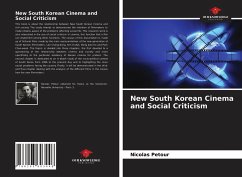This book is about the relationship between New South Korean Cinema and civil society. The study intends to demonstrate the intention of filmmakers to make citizens aware of the problems affecting social life. This research work is also interested in the use of social criticism in cinema, this function that a film can implement among other functions. The corpus of this dissertation is made up of fictional films made by the main representatives of the new generation of South Korean filmmakers, Lee Chang-dong, Kim Ki-duk, Bong Joon-ho and Park Chan-wook. The thesis is divided into three chapters, the first devoted to a questioning of the relationship between cinema and society and more specifically to the particular tendency of Korean cinema for protest. The second chapter is dedicated to an in-depth study of the socio-political context of South Korea from 1996 to the present day and to highlighting the main social problems facing the country. Finally, it will be demonstrated in the third and final chapter dealing with the analysis of the different films in the corpus how the new filmmakers.
Bitte wählen Sie Ihr Anliegen aus.
Rechnungen
Retourenschein anfordern
Bestellstatus
Storno

